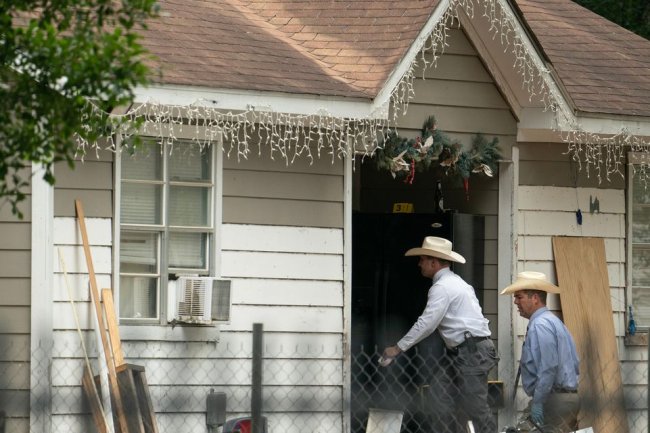In Shadow of Sanctions, Russia Courts Friends, Boasts Resilience at Flagship Economic Forum
President Vladimir Putin is expected to paint a glowing picture of Russia’s economy at the St. Petersburg International Economic Forum. Photo: afp contributor/Agence France-Presse/Getty Images By Ann M. Simmons June 14, 2023 5:30 am ET President Vladimir Putin will attempt to present Russia as primed for investment despite economic erosion from more than a year of war and sanctions, as he addresses some of the Kremlin’s remaining allies this week at the country’s annual economic conference. His aim, according to analysts, is to inspire economic confidence at home while cementing links with those abroad who haven’t shunned Russia over its invasion of Ukraine. The theme of this year’s edition of the St. Petersburg International Economic Forum—Russia’s place in th


President Vladimir Putin is expected to paint a glowing picture of Russia’s economy at the St. Petersburg International Economic Forum.
Photo: afp contributor/Agence France-Presse/Getty Images
President Vladimir Putin will attempt to present Russia as primed for investment despite economic erosion from more than a year of war and sanctions, as he addresses some of the Kremlin’s remaining allies this week at the country’s annual economic conference.
His aim, according to analysts, is to inspire economic confidence at home while cementing links with those abroad who haven’t shunned Russia over its invasion of Ukraine.
The theme of this year’s edition of the St. Petersburg International Economic Forum—Russia’s place in the new world—underlines Moscow’s efforts to reorientate toward Asia and the developing world as relations with the West deteriorate.
Putin is likely to paint a glowing picture of the nation’s economy, analysts predict, ridiculing what Moscow says is the West’s failure to bring Russia to its knees financially.
“He will be pretty optimistic about the shape of the economy [and] will go to the public with really shiny numbers,” said Alexandra Prokopenko, a former Russia Central Bank official and now a nonresident scholar at the Carnegie Russia Eurasia Center in Berlin.
The visibility of the conference—Russia’s answer to the World Economic Forum held in Switzerland—has waxed and waned over the years. Before Putin’s 2014 annexation of Crimea, it was a calendar fixture for Western business executives eager to invest in Russia’s vast energy sector.
Attendees included ’s Vikram Pandit, ’s Jamie Dimon and ’s John Mack.
Newsletter Sign-Up
The 10-Point.
A personal, guided tour to the best scoops and stories every day in The Wall Street Journal.
Subscribe NowLater, it became a kind of neutral meeting ground for Russian officials, business people and Western counterparts, many of whose governments imposed sanctions on Moscow after Crimea.
Since the Kremlin’s full-scale invasion of Ukraine last year and tougher accompanying penalties, the forum’s international allure has diminished dramatically—delegates taking part in bilateral discussions this year include a much smaller cast led by China, India, Algeria and the United Arab Emirates. The world leaders attending are from the economic lower leagues.
“Russia is trying to show itself and the countries of the Global South that Russia isn’t alone,” said Prokopenko, who left Russia shortly after the invasion.
The Russian economy so far has defied the deep slump expected following the imposition of Western sanctions, supported by a windfall from oil and gas sales, ample government stimulus and its ability to find workarounds. But a steep drop in energy revenues this year, the mounting impact of technology sanctions and the state’s slide toward economic isolation spell a troubled future.
The 2022 post-invasion sanctions are much broader than post-Crimea, making it in many cases illegal or risky for U.S. or European entities to court business ties with much of the Russian economy.
Putin is expected to address the forum on Friday, the Kremlin said. The event takes place against a backdrop of fierce fighting in Ukraine, as Kyiv’s forces battle to oust Russian troops from the nearly 20% of Ukrainian territory they now occupy.
“Recent years have witnessed an intensification in the crisis of trust between nations, making it all the more important to maintain a fair and constructive dialogue between business communities across the globe,” the forum’s organizer, the Roscongress Foundation, said ahead of the event.
Western business elites are absent from the program, and journalists from countries such as the U.S. and U.K. are barred from attending.
The main discussion panels will comprise countries that have mostly refrained from condemning Russia’s war. For example, representatives will include China, whose president has offered diplomatic support to Putin and is among a few world leaders to visit the Kremlin in the past year, during which time Moscow has become more economically dependent on Beijing.
In 2022, bilateral trade between the two economies reached a record high of over $190 billion after a year-on-year increase of 29.3%, according to information published by Roscongress.
Beijing has touted its relationship with Russia as a “friendship without limits” and sought to soften the impact of Western sanctions on Moscow by buying more Russian oil and natural gas and boosting shipments of electronics, computer chips and other goods.
SHARE YOUR THOUGHTS
What does Russia’s economic future hold? Join the conversation below.
India, which is dependent on Russia for military equipment, has benefited from cheaper Russian oil. Brazil and other Latin American countries, as well as Algeria and the U.A.E., are hoping to stay in Moscow’s favor as they try to take advantage of Russian grain, military hardware and oil supplies that once flowed to the West, analysts said.
Trade turnover between Russia and Brazil increased 13% last year, while commerce between Russia and the U.A.E. reached a high of $9 billion, making the Emirates Moscow’s largest business partner in the Arab world, according to Russian data.
Several representatives from what Russia categorizes as “unfriendly nations” had shown an interest in attending the forum, Kremlin spokesman Dmitry Peskov said in April, without naming them. “If we talk about it, they’ll just be eaten alive,” he said.
Still, the forum’s program boasts few world leaders or big names. Algeria’s President Abdelmadjid Tebboune, Cuba’s Prime Minister Manuel Marrero Cruz and the leader of Serbia, Aleksandar Vučić, are expected to be the most prominent figures at the event.
Last year, the chief executive of the American Chamber of Commerce in Russia participated in a conference panel titled “Western investors in Russia: new realities.” The chamber didn’t respond when asked whether any of its members who remain in Russia would attend this year.
Some analysts said the dearth of international participation would allow Russia to take center stage and demonstrate to its domestic audience that it is business as usual.
“A demonstration that the continuity of peaceful life is preserved,” said Mikhail Vinogradov, president of the St. Petersburg Politics Foundation, an independent research center.
Write to Ann M. Simmons at [email protected]
What's Your Reaction?

















